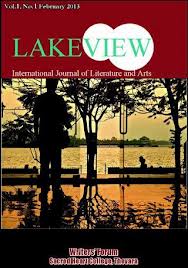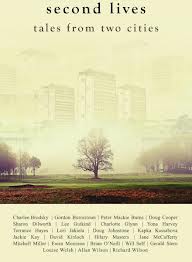-in which James Webster sums up the categories he presented at the awards –
Best Performer
When it came down to the final day, Best Spoken Word Performer was the most closely contested of all the categories, with first place going back and forth several times and only three votes separating the winner and runner-up. That runner-up was Dan Cockrill, who deserves real credit for pushing the winner all the way to the wire, receiving many enthused comments from voters along the way. One such person said they voted for him “Because he is funny, engaging and full of bags of energy. And you never get bored of him however many times you see him!”
The other nominees also deserve a lot of kudos, Raymond Antrobus (who is one of the co-hosts of Chill Pill and whose pamphlet The Shapes and Disfigurements of Raymond Antrobus was published this year) reportedly “has a way with words, is unique in delivery and is spinetingly inspirational.” While Emma Jones (regular at Bang! Said the Gun and virtuoso performer) has “A tongue so sharp they call it a mouth knife. FACT!!” and an “Uncanny ability to absorb a character and present a perspective rarely seen.” Fay Roberts (host of Hammer & Tongue Cambridge and founder of Allographic) was said by one voter to have “a range and depth that I envy. Her poems combine beautiful word-smithery, wisdom and wry humour and her highly original delivery is a delight.”
The winner, however, was Vanessa Kisuule. A phenomenal poet whose performances are often heartfelt, often funny, and always excellent, and have delighted audiences all over the UK.
Winner of a multitude of slams and a regular at festivals, she “combines warm humour with beautifully measured emotion and a sprinkling of bite, Vanessa Kisuule is simply one of the best performing poets around.” Another voter said “Vanessa’s poems actually steal me and take me on an adventure”, while another commented “Vanessa has a depth and maturity to her work I’ve never seen matched in spoken word”. The most prevalent commendation, however, was her uncanny knack of expressing the inexpressible, she has “the ability to articulate feelings previously considered ineffable; a skill as rare as it is wonderful” and “has the most relevant poetry to so many people, she finds the perfect words to express what so many people think but can’t vocalise because they don’t have her words. She is a total boss.”
Best One-Off
Another close category, with the intriguing events that were Penning Perfumes (exploring scents through poetry and vice-versa) and Poetry Parnassus (an almost unprecedented conglomeration of poets from around the globe) coming in joint second. Penning perfumes was called “innovative, bold, mixing genres and going outside poetry audiences to engage through use of the senses with a wider audience” while Poetry Parnassus was praised for being “a once in a life time gathering of poetry and poets and community and sharing and wisdom.”
Also in the running was Poetry Polaroid (mapping Edinburgh through poetry) that was “a beautiful concept that drew a lot of people into exploring the city and thinking about it in different ways”, while Binders Full of Women (beautifully hand-made binder celebrating poetry of writers who identify as female, trans, intersex or gender-neutral) that was “urgent, organised and awesome: a combination of creative publication and lively gatheration, with a side order of campaigning poetics”.
But the winner was the massive nationwide platform that was Shake the Dust. A mixture of performances, workshops and other events, it gave a platform to young people across the UK to explore poetry in a way that “visibly changed young lives, connecting the poetry and spoken word scenes around the globe with new rising stars. Total brilliance.” In fact, several people commented on the power of the event that was “really changing young people’s lives through poetry”, that “provided so many opportunities for so many young people who were able to come together for a unique and special event on such a large open scale. it changed many lives” and that was “bringing together the disparate youth in art and spoken word; an undervalued gift”
Overall: “An amazing celebration of the voice of youth”
Best Spoken Word Show
Some truly wonderful shows of different kinds were celebrated in this category, from the Wandering Word Stage that brings poets to new crowds at various festivals and provides “a marvellous sanctuary in the daytime and a hubbub of insanity at night”, to Dirty Great Love Story‘s fusion of verse and theatre, winning a Fringe First, touring to New York and according to one voter being “truly awesome inventive ninjas and made me cry”. And Emergency Poet (Deborah Alma) who provides rhymes in a crisis from a real ambulance: “The world’s first and only emergency poetry service, in a genuine 1960s ambulance, do you really need to ask why it should win?”
Runner up, Lucy Ayrton: Lullabies to Make Your Children Cry (a selection of feminist fairytales and dissection of the power of children’s stories) got a lot of love, one memorable remark saying she “not only harnesses the seductive power of fairytales to make powerfully incisive and beautifully made points about gender and society, but also she has lovely hair”
But the winner was Whistle by Martin Figura, a heartbreaking, yet uplifting, tale drawn from his own childhood that has toured throughout the UK and abroad. “It made me want to cry and I never want to cry except in the bank” said one fan, while others commented that this “Immensely personal tale of tragic upbringing yet hugely enjoyable” and that it “Invaded my dreams and will stay with me forever”. It’s a show that truly seems to have matched content to performance, with audiences saying: “Whistle is a bravura performance and a valuable text that makes no concessions to simple delivery but is delivered with great dramatic conviction.”
Finally, the comment that perhaps most sums it up is this one: “The most heartening true story of human resilience told in stunning poems I’ve ever seen in such an intense, understated show.”
Best Regular Spoken Word Night
It was a running joke on the night that we would repeatedly refer to categories as having been ‘an incredibly close race’ or having gone ‘right down to the wire’. This was not one of those categories, the winner of Best Regular Spoken Word Night was clear and deserved.
That is not to say the other nominees didn’t put up a fight, Come Rhyme with Me (blend of food and poetry) earned plaudits because “the poetry is consistently amazing both from the headliners and the open-mic-ers. Plus it’s worth going simply for the food!” While Hammer & Tongue Oxford (founding branch of the national network of slam poetry events) was praised for its “friendly and funny organizers, great community, and excellent performers”. Inky Fingers (inventive and inviting Edinburgh based collective) “provides a welcoming and open space for new spoken word artists whilst also showcasing some top spoken word talent to inspire”.
The runner up, Jibba Jabba (multi-disciplinary and superbly supportive open mic in Newcastle) really looked like giving the winners a run for their money (read: rosette) for a while with their “great performers, great venue, great audience & words that sear into your chest & stay with you for days”.
But in the end there was only ever going to be one winner: Bang! Said the Gun, whose anarchically fun and involving events have consistently raised the bar for poetry events. As the voters said “BSTG show us all how it should be done – fun and eclectic and challenging and loud and quiet and generous. They’ve also mastered the fact that poetry nights should be engaging to look at as well as listen to!”.
It’s an event that voters pointed out isn’t just good, but is also always colossal fun: “Rock and roll poetry, why shouldn’t it win?!” Plus, it always gets the audience going: “Let’s shake, rattle and roll with poetry. Need I say more. Absoposifrigginlutely BANGTASTIC!!! The best show for miles.”
Finally, Bang! Is such a unique night because it opens poetry up to new audiences: “Weekly and sometimes on the telly too. Poetry’s best chance of a tv breakthrough.” and because it “makes poetry electric and sexy”.
All very deserved winners and nominees, plus a fantastic night. Can’t wait for next year to do it all again!



























